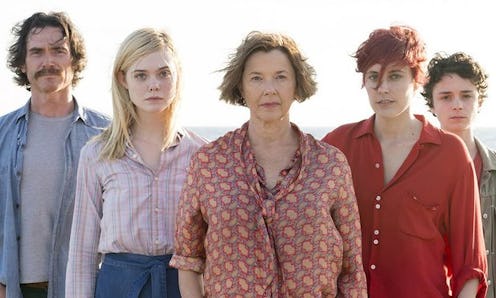
Despite its title, 20th Century Women has a bit of a deceptive premise. As the story of a mother who recruits two other women to help raise her teenage son, the film sounds, at first glance, like one of those tales that has a supposedly feminist plot, but actually sidelines its women to focus on the betterment of a male character. But this premise is a red herring, so don't be fooled. The focus of 20th Century Women is truly on its three very different leading female characters, and this turns the film's whole premise on its head.
Set in 1979, the wonderful, Mike Mills-directed movie tells the story of hippie, single mom Dorothea (Annette Bening in an Oscar-worthy performance) raising her teenage son Jaime (Lucas Jade Zumann) in sunny California. A flower child at heart, Dorothea is a bit of a hands-off mom who is unprepared when her son hits his vulnerable and influential teenage years. Lacking in other paternal assistance, she asks Abbie (Greta Gerwig) one of her boarders, and Julie (Elle Fanning), a teen neighbor slightly older than Jaime, to help Jaime learn, grown, and "become a better man." At first, this whole set-up does indeed make it seem like the movie is going to be all about Jaime. But the film quickly changes course, focusing instead on the three amazing women who have taken Jaime on as a project. In a fantastic twist, we, as audience members, learn way more about Dorothea, Abbie, and Julie than we ever do about Jaime.
And these great female characters deserve all the screentime they can get. As a child of the Depression who came of age during World War II, Dorothea is the kind of woman who sees any problem as fixable. But where she really came into her own was during the 60s when she embraced the counter culture of the decade. As a result of being somewhat of an "aging hippie," she's a bit intimidated by the budding punk scene and ongoing feminist movements.
Abbie, meanwhile, is a photographer with fire engine red hair, and is the embodiment of the early punk era of the late 70s. Her approach to how Jaime should grow is, naturally, much different than Dorothea's. Then there's Julie, still a teenager herself, who has grown up as the child of psychologists, stewed in the intense self-reflection of 1970s psychoanalysis and dipping her toes into feminism and post-feminist theory. The three women could not be more different, and it's in their conversations, interactions, and the ways they face trauma that the true heart of 20th Century Women emerges.
Jaime, as a result, drifts into the background. His initial set-up as the focus of the movie quickly vanishes, and the 20th century women emerge as the true protagonists. They all have different approaches to the task as hand, and they all do their best to raise Jaime. And in trying to teach a teenage boy how to be a good person, it becomes obvious that the women don't have their sh*t together either. Dorothea, most significantly, realizes that she's expecting too much of herself and of her female comrades in trying to "fix" her son.
20th Century Women may tackle what it means to "be a man," but even more so it explores what it means to be a woman. By shifting its focus to three very different, flawed, strong, wonderful women, in an era when women's lib and feminism were becoming mainstream, it nails many of the issues that women face at varying ages, even to this day. So don't be deceived by what might come across as a male-focused story. 20th Century Women is all about the women.